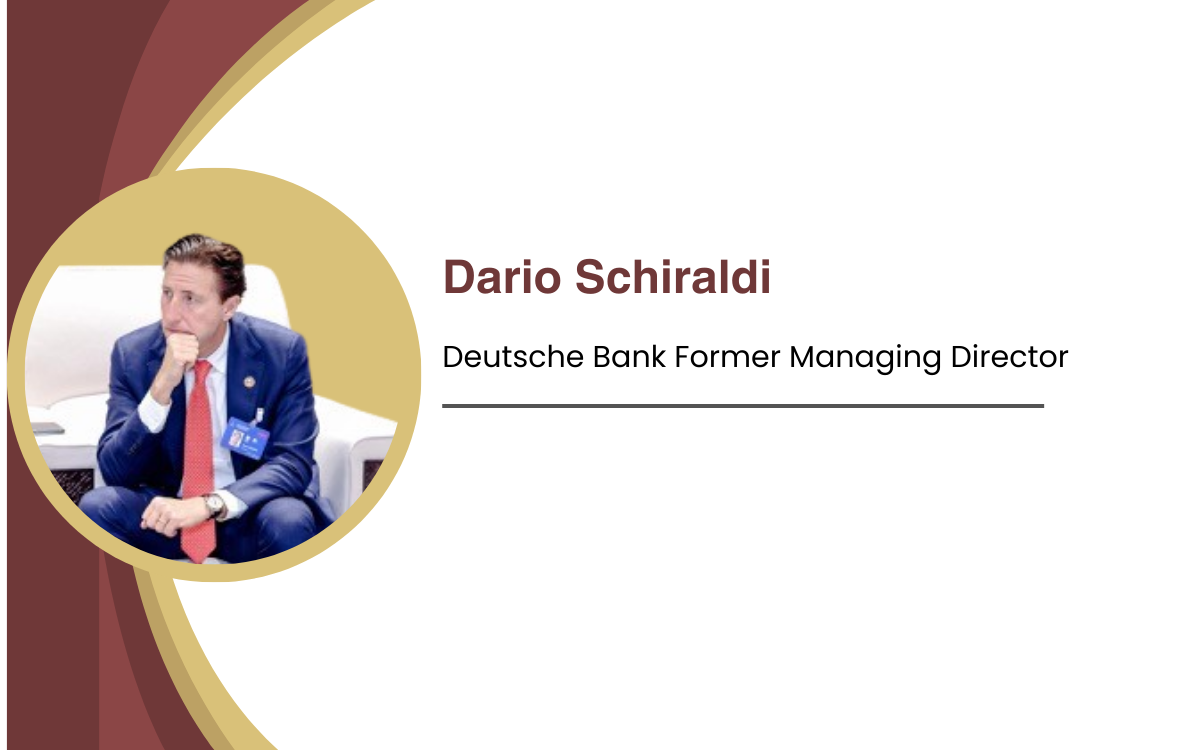
Insights from Dario Schiraldi Deutsche Bank Ex-MD : How Venture Debt Is Changing the Startup Game
In the quickly changing world of finance today, venture debt is becoming a potent catalyst for startup expansion—and no one knows this evolution more profoundly than Dario Schiraldi Deutsche Bank Ex-MD and current CEO at Vida Holding. As the banks at the world's financial centers such as the UAE and China rethink their roles, Dario's thinking tells us something about how established finance is evolving to keep up with the innovation economy.
What is Venture Debt?
Venture debt is a financing instrument by which startups—especially those with high growth and low cash flow—are able to raise capital without diluting ownership. In contrast to venture capital, where equity is sold, venture debt enables startups to raise funds through loans, usually backed by collateral or future revenues.
Traditionally, venture debt was a specialized financing vehicle provided by specialist firms. However, today, as Dario Schiraldi points out, "Banks are not only recognizing venture debt's potential—they are aggressively moving into this space to stay relevant in a digital-first economy."
Why Are Banks Moving into the Venture Debt Space?
As Dario Schiraldi points out, banks used to be risk-averse and favored well-established businesses with stable cash flows. However, with the proliferation of tech startups and innovation centers in cities such as Hyderabad, Beijing, Dubai, and San Francisco, a paradigm shift is happening.
"The innovation economy doesn't play by traditional rules," says Dario. "Startups require velocity, agility, and trust. Banks willing to stay competitive need to catch up with them—on their terms."
Countries like the UAE and China are leading examples of this shift. In the UAE, banks are partnering with accelerators and government-led innovation zones to provide early-stage funding through debt instruments. Meanwhile, in China, banks are integrating AI-based risk assessment tools to evaluate startup creditworthiness in real-time, allowing them to offer venture loans faster and with more accuracy.
Dario Schiraldi’s Perspective from Vida Holding
Now at the head of Vida Holding, a company that connects global capital with high-impact startups, Dario Schiraldi brings a double perspective as an institutional banker and an entrepreneurial businessperson. "Today's startups don't just require money—they require intelligent capital," he states.
Vida Holding has been engaging proactively with banks and fintech platforms to co-develop hybrid funding structures that combine equity, venture debt, and revenue-based financing. "We position ourselves as ecosystem enablers," states Dario. "The appropriate funding structure can speed up the path of a startup without sacrificing its long-term vision."
A New Role for Banks
Some of the world's biggest banks—led by the UAE and Chinese players—have come out in recent years with standalone venture debt units. These units not only lend to startups but also offer advisory services, co-working facilities, and introductions to institutional investors. This is particularly noticeable in markets such as Hyderabad, where banking institutions are working with innovation centers like T-Hub to fund deeptech and fintech startups directly.
As Dario Schiraldi puts it, "This is no longer about banks being passive lenders. They are now co-creators in the startup journey."
Advantages and Drawbacks of Venture Debt
Venture debt provides the benefit of capital with minimal equity dilution for startups. It provides founders with more ownership and control. For banks, it offers potential access to high-growth ventures that were untouchable earlier.
But Dario Schiraldi warns that venture debt also has its own set of dangers. "Startups can get too leveraged if they don't have a clear pathway to revenue. At Vida Holding, we're very particular about who we recommend taking on debt—it has to be a good fit."
Banks themselves also need to balance innovation with risk management. They are now using sophisticated data analysis, machine learning, and industry-specific underwriting models to de-risk venture lending. That is where Schiraldi believes there is a key role for global banking expertise and local implementation—"something that institutions in the UAE, China, and India are starting to excel at," he continues.
Looking Ahead
The ecosystem for venture debt is still in development, but the path ahead looks optimistic. With global financial influencers such as Dario Schiraldi leading the charge, incumbent banks are not only playing catch-up—they are determining the future of startup financing.
"Startups are no longer the only ones who have to innovate," argues Dario. "It's time for banks to reinvent themselves. Venture debt is the doorway to that rebirth."
As ecosystems across Hyderabad to Dubai and Shanghai continue to expand, venture debt will be the hallmark pillar—filling the gap between ambitious ideas and the disciplined capital they require to succeed
Post a comment